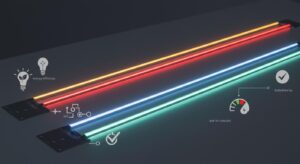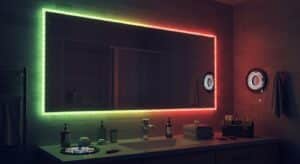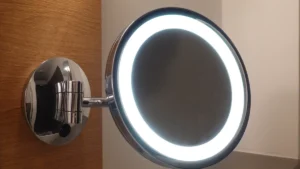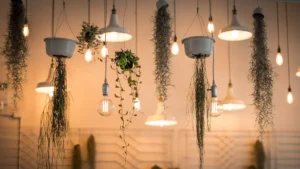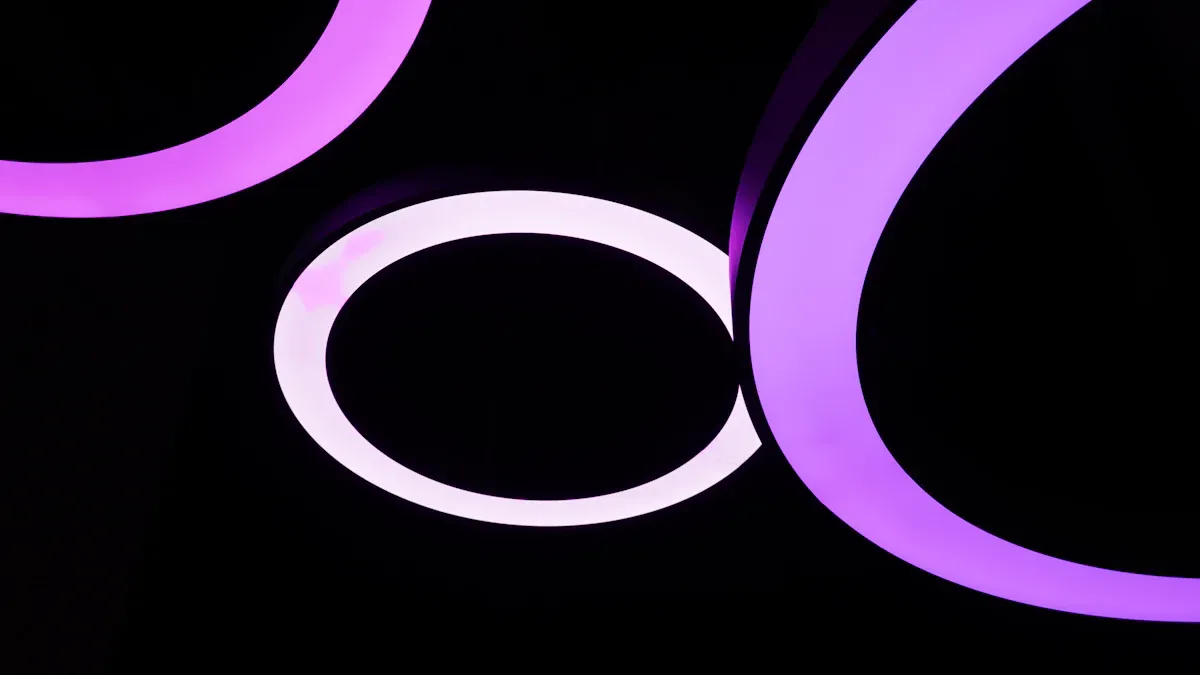
When you think about lights, flex LED strips are special for many reasons. They use less energy, so your electricity bills are lower. Also, they can fit in any space. You can use them to light up a room or make it cozy. More than 60% of new homes use these strips. This shows they are a popular choice. Their flexibility lets you change your lighting. This makes your home look cool and modern. Why choose regular lights when you can have amazing ones with a flex LED strip?
Key Takeaways
Flex LED strips use less energy. They use up to 80% less power than regular bulbs. This helps lower your electricity bills.
These strips last a long time. They can last between 50,000 and 100,000 hours. This means you will replace them less often and save money.
Flex LED strips are strong and can handle weather. This makes them good for inside and outside use.
Their bendable design makes it easy to install them in different places. This allows for fun lighting ideas.
Using flex LED strips can also help the planet. They can lower your carbon footprint and support a healthier environment.
Energy Savings
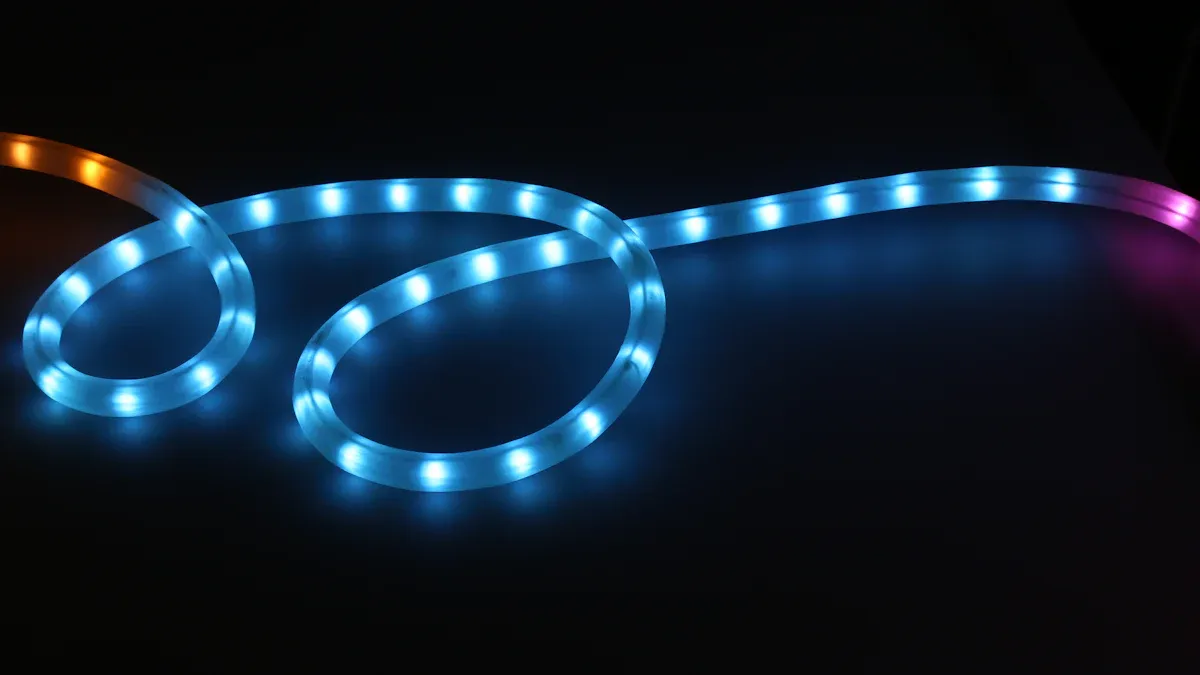
When you think about energy savings, flex LED strips are better than regular lights. They use much less electricity. This can help you save a lot on your monthly bills.
Lower Consumption
Flex LED strips usually use only 9 to 10 watts per meter. In contrast, incandescent bulbs can use up to 60 watts. Here’s a quick comparison:
Lighting Type | Average Wattage Consumption |
|---|---|
Flex LED Strip (2835) | 9 to 10 watts per meter |
Incandescent Bulb | Up to 60 watts |
Fluorescent Bulb | Around 20 watts |
This means that if you switch to a flex LED strip, you can save a lot of energy. These strips can cut energy use by up to 80% compared to incandescent bulbs. Imagine using less power while still having bright, beautiful light!
Cost Efficiency
Now, let’s see how this helps you save money on your electricity bills. By changing to flex LED strips, you can expect:
Up to 75% less power use than regular bulbs.
Many households see up to 40% savings on their monthly electricity bills after switching to LED lights.
With flex LED strips, you’ll enjoy lower energy use and save money. Over time, these savings can really add up, making your choice to use LED lighting smart.
Also, flex LED strips have a low power use of 0.5 kWh per day, which adds up to just 15 kWh over a month. This is much less than what you’d see with regular lights.
Switching to flex LED strips helps your wallet and the planet. You’ll use less energy, which means a smaller carbon footprint. Plus, many utility companies give rewards for using energy-saving lights. Here’s a quick look at some of the available rewards:
Incentive Type | Rate | Eligibility | Minimum Incentive | Maximum Incentive |
|---|---|---|---|---|
Standard Lighting | $0.13/kWh | Indoor, Exterior and Street LED Lighting replacements | $150 per project | 70% of material costs |
Fast Track Lighting | $4.00 per 4’ linear LED tube | Type A, B and C LED tubes, Qualified LED replacements | $150 per project | 70% of material costs |
New Construction Lighting | $0.10/kWh | Indoor LED lighting for new installations | $150 per project | 70% of material costs |
With all these benefits, it’s clear that flex LED strips are not just a cool choice; they’re a smart one too!
Durability
When you think about durability, flex LED strips are great. You want lights that last a long time, and these strips do just that. They have a long lifespan, so you won’t need to replace them often.
Long Lifespan
Flex LED strips can last from 50,000 to 100,000 hours. That’s really good compared to other types of lights. Here’s a quick look at how they compare:
Light Technology | Lifespan |
|---|---|
LED | 50,000 to 100,000 hours |
Incandescent | 750 to 1,000 hours |
Fluorescent | 7,000 to 15,000 hours |
With such a long lifespan, you can enjoy bright lights without changing them often. Manufacturers test these strips carefully to make sure they are high quality. For example, they use LM80 Certification to check how well the strips keep their brightness over time. This testing means they run under different temperatures for at least 6,000 hours.
Weather Resistance
Flex LED strips are also made to handle different weather. They have various waterproof ratings, so they can be used indoors and outdoors. Here’s a breakdown of common ratings:
IP Rating | Description |
|---|---|
IP65 | Dust-tight and protected against water jets from any direction. Good for damp places like patios or light rain. |
IP67 | Dust-tight and protected against being underwater up to 1 meter for 30 minutes. Great for heavy rain or short submersion. |
IP68 | Dust-tight and protected against being underwater for more than 1 meter. Best for underwater use like fountains or ponds. |
These ratings mean you can use flex LED strips in many places, from your garden to your living room. They resist rain, snow, and humidity, so they work well even in tough weather. The lamination technology acts like a shield, helping them survive bad weather without losing their function.
Besides being weatherproof, flex LED strips also resist UV rays, flames, and chemicals. This makes them great for outdoor use where the sun and other elements can be a problem.
With a warranty of 1 to 5 years, depending on the brand, you can trust that these strips are made to last. So, when you pick flex LED strips, you’re not just getting cool lights; you’re choosing a strong solution that will last for years.
Flexibility
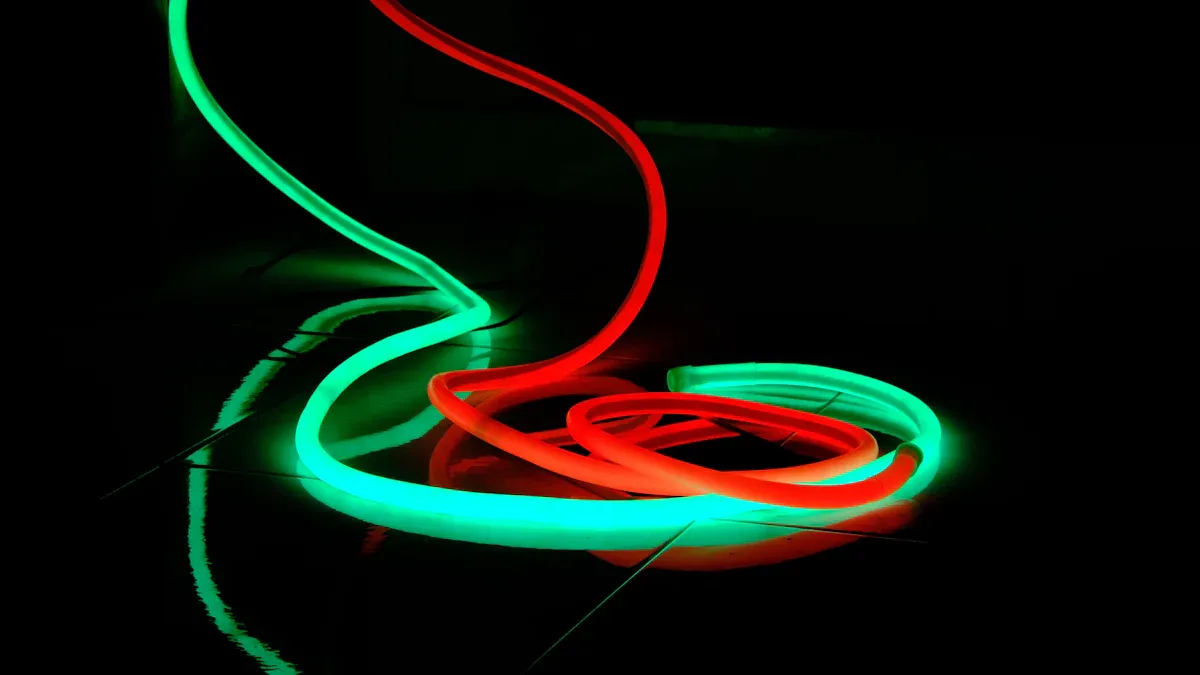
Flex LED strips are great because they are flexible. Their design lets you use them in many places. This makes them popular with homeowners and designers.
Adaptable Design
One of the best things about flex LED strips is that they can bend and fit different shapes. You can easily put them in curved or odd spaces. Here’s a quick look at some features that help with this:
Feature Description | Explanation |
|---|---|
Bending Capability | Flexible LED strips can bend in many ways, so they fit different shapes and surfaces. |
Silicone Diffusers | Flexible silicone covers help spread light evenly while keeping flexibility. |
Customizable Profiles | Designers can change the path of the LED strips to meet specific design needs, giving them more creative options. |
With these features, you can make beautiful lighting designs that fit well in your home or office.
Various Applications
Flex LED strips are very useful. You can use them in many places, from homes to businesses and even factories. Here are some common uses:
Setting | Applications |
|---|---|
Residential | 1. Under-Cabinet Lighting: Light up kitchen counters with a smooth glow. |
2. Accent Lighting: Highlight features like coves and staircases. | |
3. Outdoor Spaces: Great for patios and gardens because they resist water and dust. | |
Commercial | 1. Retail Displays: Make products stand out with bright lighting. |
2. Hospitality: Create friendly atmospheres in hotels and restaurants. | |
3. Events and Festivals: Add fun lighting effects to celebrations. | |
Industrial | 1. Architectural Outline Lighting: Light up building edges with continuous lights. |
2. Automotive Lighting: Improve car interiors and exteriors with flexible lights. |
You can even see flex LED strips in creative projects. For example, some designers use them to light up stained glass windows without damage. Others use them to highlight glass countertops or sculptures with hidden lights. The options are endless!
Flex LED strips not only fit your space but also make it look better. Whether you want a cozy feel at home or a bright display in a store, these strips can do it all.
Easy Installation
Installing flex LED strips is super easy. This makes them popular with DIY fans. You don’t have to be a pro to start. With a few tools and some basic skills, you can change your space quickly!
DIY-Friendly
To start your installation, gather the tools you need. Here’s a quick list of what you might want:
Soldering iron with a fine tip
Solder wire (0.6mm to 0.8mm diameter)
Flux
Tweezers
Magnifying glass or microscope
Scissors
Tape measure
Wire strippers
Once you have your tools ready, follow these simple steps:
Gather the Tools: Make sure you have a power supply, power cord, waterproof connectors, and maybe mounting clips.
Prepare the Area: Clean the surface so it’s dry and smooth.
Measure, Cut, and Connect: Measure the area, cut the LED strip at marked points, and use waterproof connectors.
Install the LED Strip: Peel off the sticky backing and press it onto the surface, using clips if needed.
Waterproof All Connections: Use silicone sealant or waterproof boxes for extra protection.
Connect to Power: Turn off the power before connecting, then link the power supply to the LED strip.
Test Your Work: Turn on the power to check the lights and make changes if needed.
With these steps, you’ll have your flex LED strip up in no time!
Low Maintenance
One of the best things about flex LED strips is how little care they need. Here are some easy tasks to keep them shining bright:
Regular Cleaning: Wipe them with a soft cloth and mild soap to stop dirt buildup.
Check for Damage: Look for any cracks or discoloration often.
Keep Electrical Connections Secure: Make sure all connections are tight to avoid problems.
By following these easy tips, you can enjoy your beautiful lights without worrying about frequent replacements. Flex LED strips can last for years, making them a smart choice for your lighting needs.
Flex LED strips are a great choice for your lighting needs. Their design flexibility helps you make beautiful lighting in any area. You can easily change them to fit different surfaces, so putting them up is simple. Also, with intelligent control options, you can control your lights using mobile apps, which makes life easier.
Here are some main benefits of flex LED strips:
Energy Efficiency: They use up to 80% less energy than regular bulbs, which saves you money.
Long Lifespan: With a lifespan of up to 50,000 hours, you won’t have to replace them often.
Durability: These strips can handle weather, impacts, and high heat, so they last a long time.
In short, flex LED strips mix usefulness with style, making them a smart choice for any lighting project.
FAQ
What are flex LED strips made of?
Flex LED strips consist of a flexible circuit board with embedded LED lights. They often feature a silicone or plastic coating for protection against moisture and dust.
Can I cut flex LED strips?
Yes, you can cut flex LED strips at designated points marked on the strip. This allows you to customize the length to fit your space perfectly.
How do I install flex LED strips?
Installing flex LED strips is simple! Clean the surface, peel off the adhesive backing, and stick the strip in place. For added security, use mounting clips.
Are flex LED strips dimmable?
Many flex LED strips are dimmable, but you need a compatible dimmer switch. Check the product specifications to ensure compatibility before purchasing.
How long do flex LED strips last?
Flex LED strips typically last between 50,000 to 100,000 hours, depending on usage and quality. This longevity means you won’t have to replace them often!
